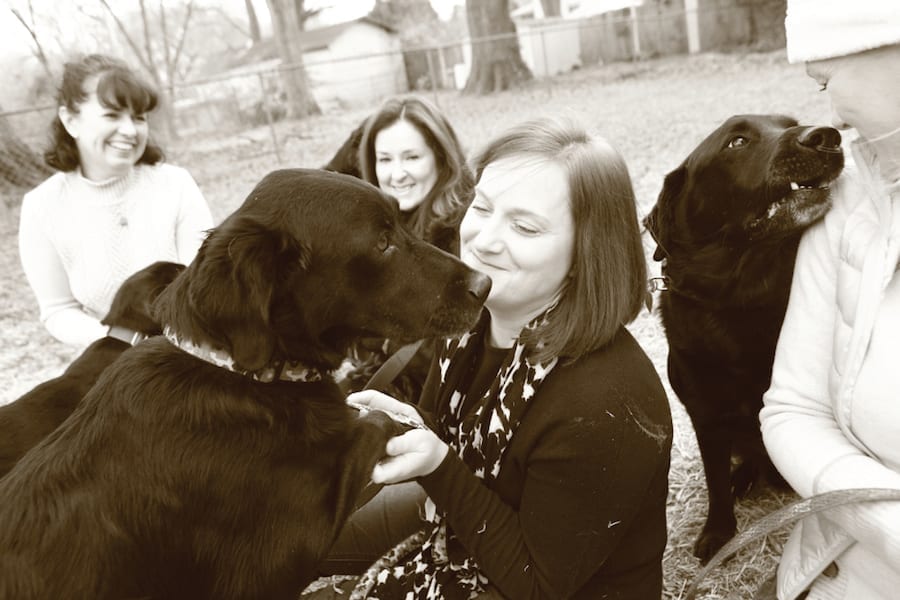Milton didn’t make it.
The Labrador retriever ended up in a North Carolina animal shelter over the holidays. He had a mass inside his mouth and needed immediate care.
Lucky Labs Rescue tried to help Milton, but resources are typically in short supply at the holidays. Fosters and transport volunteers are out of town, and cash resources are thin. The shelter did its best for Milton, said rescuer Kelly Eubanks, but it was too late to save him and the dog was euthanized.
Although animal rescuers sometimes see the worst — malnourished or abused animals, dogs kept in cages all of their lives or dogs or cats that have had litter after litter because they aren’t spayed or neutered — they keep going, with the hopes of saving as many homeless pets as possible.
“You do the best you can,” said Eubanks, transport coordinator for the Charlotte, N.C.-based Lucky Labs. “We all pray we win the lottery or that before we die, something makes this problem go away. It’s so much better than it was, but it’s a work in progress.”
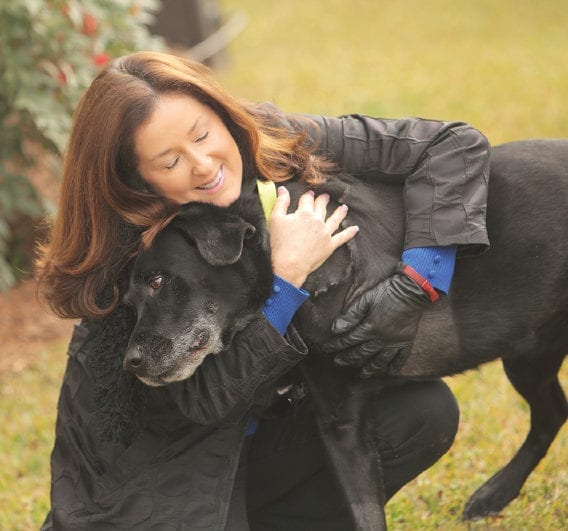
Wendy Adams, co-founder of Lucky Labs with her dog, Hampton.
Labrador retrievers have ranked as the No. 1 most registered dog by the American Kennel Club for the past 25 years. This popularity means indiscriminate breeding, Eubanks said, although she doesn’t blame all breeders for the number of Labs and Lab mixes that turn up in shelters and need rescuing.
“Too many people that shouldn’t have Labs have them,” Eubanks said. Unwanted Labs often end up dumped in affluent neighborhoods by well-meaning owners who can’t care for them anymore, thinking that someone will take care of the dogs.
Sometimes owners don’t realize that Labs take a long time to mature. Others are given up because they weren’t good hunting dogs. Recently, a Lab ended up with Lucky Labs because the owners were having a baby and didn’t want dog hair in the house. The lab’s vet records were impeccable, and it had been well cared-for, but the owners didn’t want a dog in the household with the new baby coming.
“You have to have a thick skin in rescue,” Eubanks said.
Lucky Labs Rescue networks with other Lab rescues and shelters across North Carolina, Georgia, and South Carolina. If one rescue can’t transport a dog in need, Eubanks said she can rely on the other organizations.
“Dogs got me into rescue,” she said. “The people keep me there. When someone calls, you can’t not help them. It’s a passion.”
Fostering Labs at Lucky Labs Rescue
As a foster for Lucky Labs Rescue, Ginny Faircloth of Rock Hill, S.C., has suffered the loss of a remote control, a Bible, a picture frame and even an ottoman to the jaws of her various rescues.
“I’ve had some doozies,” Faircloth said with a laugh.
Smith and Wesson are Faircloth’s current fosters, with Smith being the culprit behind the destroyed remote, picture frame and holy book.
“Anything plastic, he loves,” she said. “But it’s all worth it. The dogs I’ve had have been amazing dogs.”
Smith and Wesson, Faircloth’s 12th and 13th fosters for Lucky Labs, were kenneled together while in rescue in Texas and eventually made it to a York County Craigslist ad. The skittish Smith is bonded with Wesson, and Faircloth hopes they can be adopted together.
As a foster, it’s Faircloth’s job to interview prospective adopters to see if a particular dog is the right fit for them.
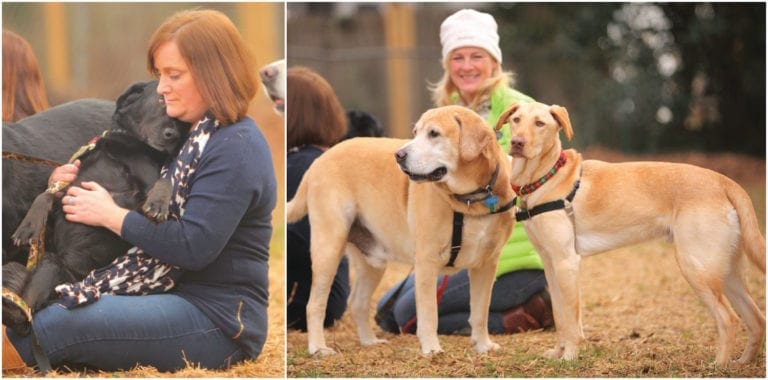
Right: Ginny Faircloth shares a tender moment with Smith, her Lab from Texas, that is available for adoption. Left: Donna Norcross with Dudley and Tucker, blonde labs.
“I try to ask questions to make sure they know how to handle a large dog,” she said. “Lucky Labs encourages the person to take the dog home to see how the dog does in their environment. I want what’s right for them and the dog. And I’m not going to be offended if you bring the dog back.”
Faircloth lists some of her success stories, including her first foster with Lucky Labs – Newton, who went to live out in the country. Clyde accompanies his owner, who works for an engineering firm, to the office. Simon was feral when he came to Lucky Labs, cowering in Faircloth’s bedroom. She worked with Simon for seven months, and the dog came out of his shell when yellow Lab Sam joined the household.
Sam was adopted after two weeks with Faircloth. Simon was adopted after another two weeks, adopted by a family with two boys.
“People ask me, ‘How do you give (the fosters) up?’” Faircloth said. “I see myself as a stopping point in finding them a permanent home. I just enjoy it. I probably love animals more than humans sometimes.”
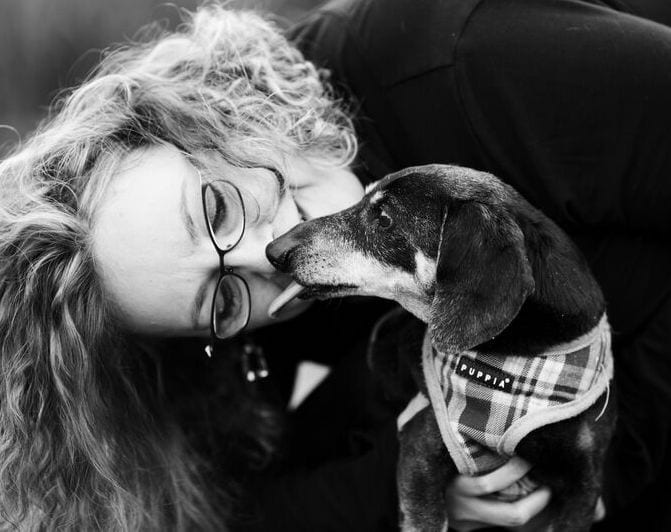
Jane Bird of Spartanburg, S.C. gets a kiss from Marvin, her short-haired rescue dachshund.
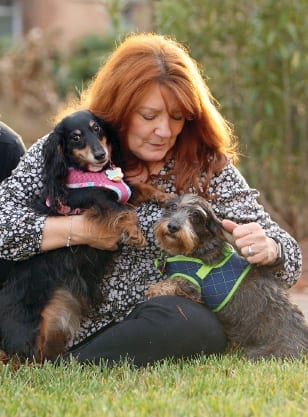
Roxanne Brooks of Fountain Inn, S.C. with her rescue dachshunds, Mindy and Emmy.
Small dog, big personality
Three special short-legged, long-bodied dogs inspired Jane Bird to get involved with dachshund rescue.
Hildi came along first, when Bird, of Spartanburg, South Carolina, and her new husband got Hildi as a puppy about 25 years ago. Bird fell in love with the feisty breed. Hildi died at age 12, and Bird said her heart just felt so empty.
“I wanted to get involved and felt compelled to work with local all-breed rescue, but whenever a doxie came in, it seemed I was the only one who understood them,” she said. “Soon I realized I could be more helpful focusing on the dachshund and dachshund-mixes.”
Another rescue that specialized in another breed took in Lucy, “a crazy dachshund they didn’t understand.” Lucy had been abused and injured in her previous home.
Lucy hated Bird’s husband, and Bird reached out to other dachshund rescuers for help. She found Dachshund Rescue of North America, joining the group in 2003. DRNA, in turn, found a home for Lucy, “and she lived happily ever after,” Bird said.
Then along came Buster, a dachshund with a big personality that Bird says taught her so many things over the years that she refers to him as her “Yoda,” the wise teacher from the “Star Wars” movies. Buster had begun to have seizures, and his hair fell out, and his young owner was overwhelmed with caring for him. She was heartbroken when she gave him to Bird through DRNA.
“Buster was one of my very first foster dogs working with DRNA,” Bird said. “He lived to be 15½ years old and never left us — what we rescuers call a ‘foster failure.’”
DRNA began with a group of dachshund fanciers who exchanged stories and got to know each other via the Internet. Sometimes the group was alerted to dachshunds in shelters or of a homeless dachshund in need of a home and members would rescue the dogs.
“We realized if the individual rescuers banded together, expenses and vet care could be shared, and it would be more beneficial cost-wise,” founder Jane Lantz said.
The group incorporated as a rescue in January 1999. Now, the group’s 25 or so members rescue 400 to 500 dogs a year, in the Carolinas, Virginia, Pennsylvania, Ohio, New York, Delaware, Maryland and Illinois.
Since 1999, they’ve placed 11,100 dogs in new homes or reunited them with their owners. Forty-five dogs are currently up for adoption through DRNA. Since 2003, Bird has fostered close to 100 dachshunds, sometimes five or six dogs at a time.
“Some stay a day, some a year,” she said.
Dachshunds often end up in rescue because owners don’t research the breed before they bring one home. Lantz said dachshunds are typically headstrong and can be prone to medical issues, such as back injuries, due to their long bodies. Dachshunds also end up in rescue for non-breed specific reasons, such as when their owner moves or dies, or when a puppy mill or hoarding situation is discovered.
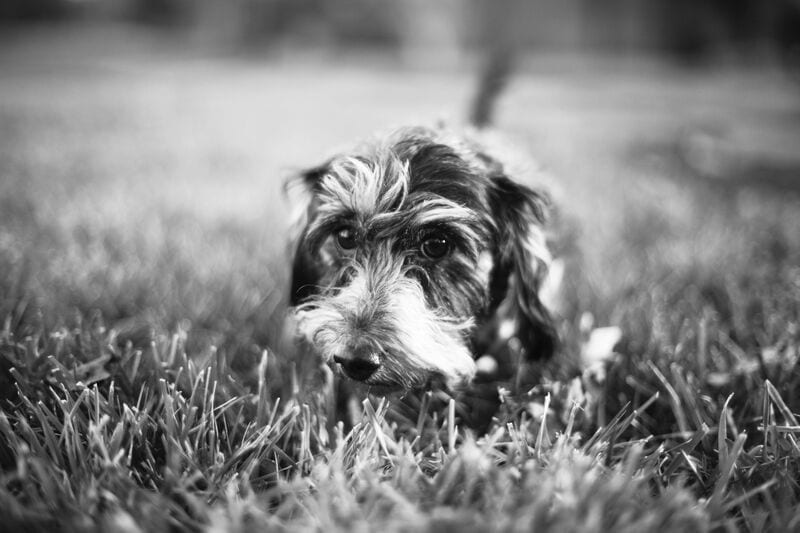
Although there is some heartache involved, Lantz said that’s balanced by all of the success stories.
“We’re so happy when we find a home for them,” she said. “We want to see them in good homes. There’s a lot of happiness in rescuing dogs.”
Controlling cat colonies
Lauren Bongers of Charlotte has been an animal lover all of her life, having grown up on a farm in Florida with dogs, cats, birds and about 20 horses. So when Lily, a 6-month-old homeless kitten, was found under a friend’s car about seven years ago, Bongers came to the rescue.
Bongers was in college at the time, and her parents discouraged her from taking in an animal, worried that it would be too much responsibility for a student. But Bongers, who volunteered for a low-cost spay and neuter organization while in high school, couldn’t say no.
It didn’t take long for Bongers to take in another cat in need of a home — Boo Radley, now 4 years old. Boo came from Moore County Neighborhood Cats, an organization in Southern Pines, North Carolina, that traps feral cats and adopts out the kittens of those that are pregnant. Bongers’ mother volunteers with the rescue, keeping foster cats in her barn, and Bongers recently fostered an orange tabby named Peaches from the rescue.
“I fell in love with Peaches and I knew I could find her a home in Charlotte,” Bongers said. Turns out, Peaches’ new owner was allergic to her, but her parents took the cat in.
“Peaches went from Charlotte to Richmond, Virginia — she’s getting a tour of the South,” Bongers said with a laugh.
Moore County Neighborhood Cats came about after rescuers, dedicated to controlling feral cat colonies in the area, began working with their local government and animal control to try to reduce the number of cats coming into the county shelter. The program is funded by the Moore County Fix’m Fund, to which residents contribute through their water and tax bills, said Pat Parrish, who is considered the “boots on the ground” for the organization. She and a core group of about seven volunteers trap the cats, transport them to the low-cost spay and neuter clinic in Vass, North Carolina, and release them back to their colonies after their surgeries, a program known as TNR, or Trap, Neuter and Return. The volunteers work with caregivers of the cat colonies, who often start feeding one or two stray cats, but often become overwhelmed when the strays begin reproducing.
“It can really get out of hand,” Parrish said. “We always get called after it’s out of control.”
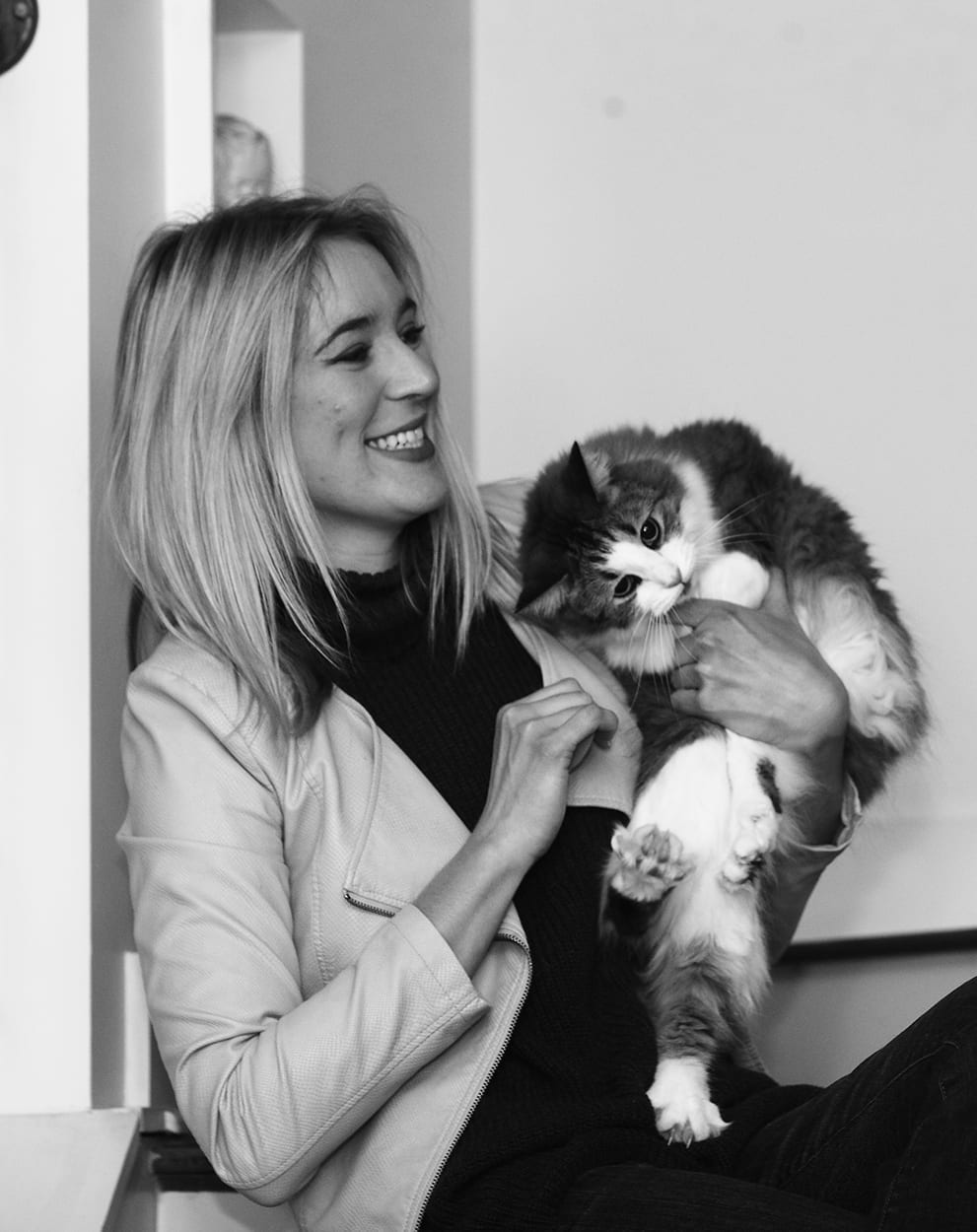
Lauren Bongers of Charlotte, N.C. is the rescue owner of Boo Radley.
But Parrish understands the well-meaning intent of the caregivers.
“A lot of these are ‘throwaway cats’ that have been abandoned — they’re not really feral,” she said. “A lot of these people don’t have a lot and they will sacrifice to feed these cats. I’m very happy to help people who want to help animals.”
In just one year, MCNC members guided and assisted caretakers in the trapping and neutering of more than 80 cats in Southern Pines, which has prevented the birth of more than 700 kittens, according to conservative estimates, Parrish said. Besides being neutered, the trapped cats are tested for feline leukemia, microchipped, vaccinated, treated for fleas and receive other needed health care.
Adoption events, hosted by Southern Pines businesses, have helped place more than 45 of the 80 cats in new homes.
Bongers said she couldn’t imagine life without her rescued cats and knows there are still so many pets that need homes in the Charlotte area and beyond. She just recently began volunteering with North Mecklenburg Animal Rescue, a group that recently opened a shelter in Charlotte’s NoDa neighborhood where Bongers lives. She’ll contribute by cleaning cages and walking dogs. Like so many other animal lovers and rescuers, she wishes she could do more.
“I would love to take them all in,” she said. “At least I can help find them homes.”
To contact the rescues or to volunteer, please contact:
Lucky Labs Rescue: www.luckylabsrescue.com
Dachshund Rescue of North America: www.drna.org
Moore County Neighborhood Cats: 910-986-0468
Most breeds have dedicated rescue organizations, or you can contact your local Humane Society for information.
By Jenny Arnold
Photographs by Josh Norris

